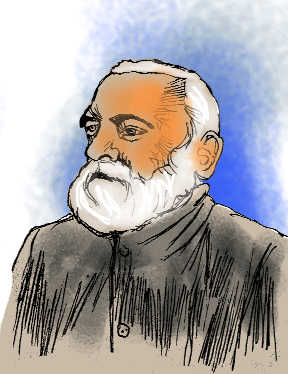RK Malhotra
“Had Waheed-ud-Din ‘Saleem’ Panipati been free from the problems of ‘rozi-roti’ (livelihood), he would have surely been far greater in stature than Maulana Altaf Hussain ‘Hali’, the supreme glory of Urdu literature,” says (late) Professor 'Akhgar' Shahani, Karnal-based Grand Old Man of letters. Even as it is, ‘Saleem’ is with Bulbul-e-Hind Allama ‘Iqbal’, the well known writer of “Sarei jahan sei achha Hindustan hamara”. It has been rightly said: “Iqbal and ‘Saleem’ are two seminal tunes of the same flute,” both equally all out for the freedom of the country. If ‘Iqbal’ came out with:
Mazhab nahin shikhata apas mein bair rakhna,
Hindi hain hum watan hai Hindustan hamara
(Religion doesn’t teach us to be at daggers drawn with each other. We are Indians, one and all, and India is our country, one divided whole)
‘Saleem’ gave us:
Zarrei ho toh jam jao keh sehra nazar aae!
Qatrei ho to mil jao keh dariya nazar aae
(If you are sand particles, come together to give the impression of a vast desert. If you are petty drops of water, come together and become a mighty river)
But ‘Saleem’ doesn’t stop here; he goes a step further and openly avers:
Agar aazadi-e-Hindustan pinhan hae jailon mei
Toh hae mushtaq har
Hindi dar-o-deewar-e-zindan ka!
(If the freedom of Hindustan is hidden behind iron bars, then every Indian is mad in love after the walls and doors of jails!)
He openly calls out to every one of his countrymen:
Khoon sei lab tar tujhei karnei hein toh aa!
(If you want to know the taste of blood, come join my caravan!)
Even in the company of Sir Syed and ‘Hali’, ‘Saleem’ walked his way all by himself, leaving his footprints in his unique way of life. Prof Jagan Nath ‘Azad’ himself once told me the background of his famous couplet:
Daman-e-geiti peh naqsh apna bithatei jaen gei,
Jab chalein ham nae rastei banatei jaen gei
(On the surface of the earth, we will always leave our footprints behind. When we move along, we will beat our paths all anew!)
And, adds ‘Azad’, “I composed this couplet after paying my regards to ‘Saleem’ at his withering grave in Malihabad when once I went there in the company of ‘Josh’ Malihabadi, my chief editor at “Ajkal”.
Saleem’s father was a devoted “majawar” (caretaker) of Mazaar-e-Qalander at Panipat and his mother was a religious lady. Poor Waheed was thus born into the lap of poverty. But he was a rare personality of intelligence and wisdom from Day one in life. He mastered every word of the Holy Koran very early in life. He received his early education in Urdu, Persian and Arabic at Panipat and, then, joined Oriental College, Lahore, for further studies. His scholarship of Rs 5 per month was his only support there — out of which too he saved a “substantial” sum of Rs 3 for his widowed mother at Panipat, who was always praying for his glorious success in life. Life was out and out a bed of thorns. But, then, as ‘Sahir’ said much later: “Woh phool khil kei raheigei jo khilnei walei hain” (Whatever the situation, the flowers created to bloom will surely bloom at last)
When ‘Hali’ fondly recommend his name to Sir Syed, he took no time to mark him out for his literary secretary. But even there the self-respecting ‘Saleem’ always had his own way, standing fearlessly against the rising winds, caring a fig for the consequences. Full confidence as Sir Syed had in his brilliance, he always kept him closest to his heart.
Later, when Osmania University was established in Hyderabad, Sir Syed himself sent ‘Saleem’ to join the institution as an Assistant Professor of Urdu. On the basis of his superlative intelligence, he was, soon after, promoted as Professor — first ever Professor of Urdu in the Indian subcontinent. It was in this position in Hyderabad that ‘Saleem’ worked upon “Istlahaat”, the only book on the subject so far. It has been rightly said about this masterpiece of ‘Saleem’: “There never was a book of this type before and there will never be any of this type on the subject in Urdu at least!”
Where shall we find a ‘Saleem’-like poet, scholar, writer, linguist, critic, and above all a teacher, in the present day world of “hollow men” where none is ready to perspire without an ulterior motive? May his tribe increase!
(The writer is an Urdu poet, better known as
Dr ‘Kumar’ Panipati)
Unlock Exclusive Insights with The Tribune Premium
Take your experience further with Premium access.
Thought-provoking Opinions, Expert Analysis, In-depth Insights and other Member Only Benefits
Already a Member? Sign In Now










